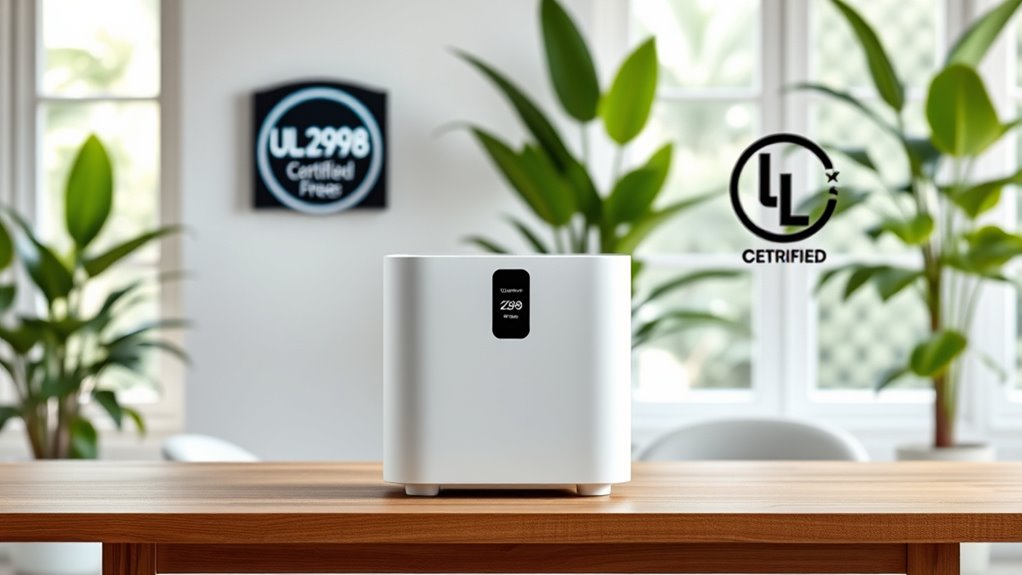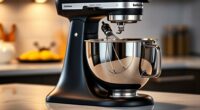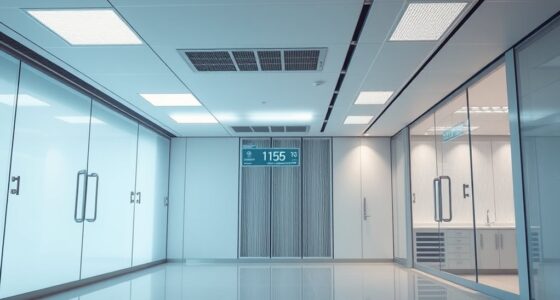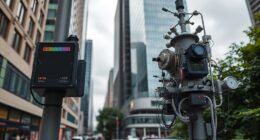UL 2998 certification confirms that your air cleaner doesn’t emit harmful ozone, ensuring it’s safe and effective for indoor air quality. This certification tests the device’s design and emissions, verifying that ozone levels stay within safe limits. Choosing a UL 2998-certified cleaner means you’re prioritizing health and safety while still improving air quality. If you want to know more about how this certification works and why it matters, keep exploring these details.
Key Takeaways
- UL 2998 certifies that air cleaners do not emit harmful ozone levels, ensuring safe indoor air quality.
- The certification involves rigorous testing to confirm devices meet strict safety and performance standards.
- Ozone emissions from poorly designed air purifiers can cause respiratory health issues; UL 2998 prevents such products.
- Certified products are distinguished in the market, promoting safer, ozone-free air purification solutions.
- UL 2998 provides consumers and manufacturers assurance of device safety, supporting informed purchasing and manufacturing decisions.

Are you wondering what UL 2998 certification signifies for your clean air products? If you’re invested in air purification and want assurance your devices meet the highest safety and performance standards, understanding UL 2998 is vital. This certification specifically evaluates whether an air cleaner is free of ozone emissions, which can be harmful when present in high concentrations. Knowing this helps you select products that deliver effective air purification without risking additional health issues caused by ozone exposure.
UL 2998 establishes strict certification standards designed to verify that air cleaners do not produce ozone at levels that could jeopardize indoor air quality. As a consumer or manufacturer, you can rely on this certification as a trusted indicator of safety and compliance. It’s not just about filtering air; it’s about ensuring that the device you use or produce adheres to strict guidelines that prevent ozone emissions, which are common with some older or poorly designed air purification systems. This standard is particularly important because ozone, while sometimes used in certain industrial applications, is a known respiratory irritant and has been linked to health problems such as coughing, throat irritation, and chest discomfort.
UL 2998 certifies air cleaners to prevent harmful ozone emissions, ensuring safer indoor air quality.
When a product is UL 2998 certified, it means it has undergone extensive testing to confirm it doesn’t generate ozone beyond safe limits. The testing process assesses the device’s design, operation, and emissions, providing peace of mind that it meets the safety criteria set forth by certification standards. For consumers, this means choosing products that are both effective at cleaning indoor air and safe for your household or workspace. For manufacturers, obtaining UL 2998 certification can differentiate your products in a competitive market, emphasizing your commitment to safety and quality.
This certification also promotes innovation within the air purification industry, encouraging companies to develop ozone-free technologies. It helps establish a benchmark for the industry, guiding manufacturers toward safer, more environmentally friendly solutions. As a result, you benefit from cleaner indoor environments without the risk of ozone-related health issues. Whether you’re seeking a home air purifier or sourcing equipment for commercial use, choosing UL 2998-certified products ensures you’re prioritizing safety alongside performance. Additionally, staying informed about vetted products can further ensure you select options that have been thoroughly tested for safety and effectiveness.
Frequently Asked Questions
How Often Does UL 2998 Certification Need Renewal?
You need to renew your UL 2998 certification every year to maintain its validity. Certification renewal is essential because it guarantees your ozone-free air cleaner meets current safety and performance standards. The certification’s validity typically lasts for 12 months, so you should plan to update it annually. Staying on top of renewal deadlines helps you avoid lapses in compliance and guarantees your product continues to be recognized as ozone-free and safe.
Are There Specific Brands That Only Meet UL 2998 Standards?
Did you know that less than 10% of air cleaner brands only meet UL 2998 standards? Some brands prioritize this certification to enhance their reputation, but not all. You should research each brand’s certification process, as it reveals their commitment to ozone-free air purification. While specific brands may claim UL 2998 compliance, confirming their certification ensures you’re choosing a reliable, ozone-free air cleaner.
Can UL 2998 Certification Be Transferred Between Models?
UL 2998 certification cannot be transferred between models, as each model requires its own testing and approval. You need to verify model compatibility with UL standards individually, since certification is specific to a product’s design and features. If you’re considering upgrading or changing models, you’ll have to go through the certification process again for the new model to guarantee it meets UL 2998 standards.
What Is the Cost Range for UL 2998 Certification?
Think of UL 2998 certification costs as the tolls on a journey through a busy market street. You might pay between $5,000 and $15,000, depending on the complexity of your air cleaner. Certification expenses include testing fees, documentation, and inspection costs. While this range varies, investing in certification guarantees your product meets safety standards and gains consumer trust, making the expense well worth the journey’s reward.
How Does UL 2998 Certification Compare to Other Air Cleaner Certifications?
You’ll find UL 2998 certification stands out because it specifically guarantees ozone-free air quality, meeting strict certification standards. Unlike other certifications, it emphasizes safety and environmental impact, making it a reliable choice for cleaner indoor air. Compared to general air cleaner certifications, UL 2998 offers a higher level of assurance that your device won’t produce harmful ozone, helping you select products that prioritize health and meet rigorous safety benchmarks.
Conclusion
With UL 2998 certification, you’re not just choosing an ozone-free air cleaner—you’re inviting a breath of pure, fresh air into your life. Think of it as opening a hidden garden, where every inhale is a whisper of cleanliness and safety. This certification is your shield against unseen pollutants, turning your space into a sanctuary. Embrace the peace of mind that comes with knowing you’re protected by a standard that’s as reliable as a trusted friend.










